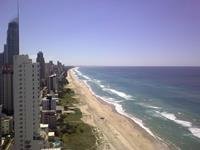Gold Coast Gold

It is yet to sink in for most of the nation that 2008 and a good part of the future of Australia belong to Queensland and in particular the south east corner of the Gold Coast.
Twenty years ago, Brisbane hosted Expo and the first signs emerged that this state, known for years as the Cinderella state, was about to have a glass slipper placed on to its foot.
Brisbane blossomed, became the sub-tropical fun capital of the north and has not looked back since.
Nor has regional Queensland, especially the Gold Coast.
Ten years ago, the Gold Coast suffered high unemployment (especially among its youth), its main income stream of tourism was faltering and the housing industry, still dependent on price fluctuations in Sydney, was in the doldrums.
Now Queensland and the Gold Coast are a different ball game. We have credibility -- in finance, style, quality of life, political significance and in social activism -- in ways that are a clarion call about the future.
The Gold Coast, the fastest growing city in Australia, is on the cusp of monumental change.
Its population is likely to be 640,000 within three years, it has become the hub of the nation's cheap airfare tourism and its building boom continues despite a slowdown in other major cities.
It has been the fastest growing city in Australia for 25 years in a row and new projects such as the $700 million Hilton Hotel and the $250 million redevelopment of the Robina Town Centre show that the pace of development isn't about to slow.
The good news for the Gold Coast doesn't stop there. Theme parks continue to grow, the city's national sporting franchises in rugby league, basketball, soccer and Australian rules are either steaming ahead or about to be launched.
Plans for a new Gold Coast hospital are in the pipeline, and development of educational facilities in the city is booming. But the real promise for the New Year lies in Queensland finally having a prime minister.
In keeping with the shift of population, intellectual property and business north from Sydney and Melbourne to southeast Queensland, political power in the form of Kevin Rudd and Treasurer Wayne Swan holds the prospect of a new deal for the Sunshine State.
More important than the infrastructure favors he may bestow on Queensland, Mr. Rudd brings a north-of-the-Tweed perspective to the nation's politics.
For the next three years at least, Queensland politicians will not have to gauge the opinion of the right wing of the NSW Labor or Liberal parties before speaking out on policy.
And for the first time since 1945 when Frank Forde temporarily became prime minister -- Queensland's views actually matter.
Mr. Rudd's realignment of national politics is likely to greatly change the way in which southerners, commercially at least, view the former Wild North.
This year also hold great promise for solving some of the problems that have been niggling Gold Coasters: unemployment, the declining supply of water, the challenge of climate change and power shortages.
A combination of the resources boom, action on the southeast Queensland water grid, and Mr. Rudd's forthright policy on the reduction of greenhouse gases, heads us in the right direction.
This city continues to be the premier place for good living in Australia.
There is no reason why 2008 should not be even better than 2007
.
